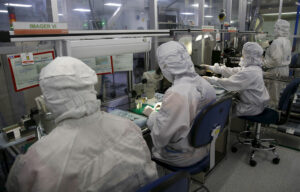By Justine Irish D. Tabile, Reporter
EXPORTS are expected to take a hit after US President Donald J. Trump announced a plan to impose 25% tariffs on semiconductors this year, analysts said.
“Higher US import tariffs, especially the reciprocal tariffs, could slow down Philippine exports,” Rizal Commercial Banking Corp. Chief Economist Michael L. Ricafort said via Viber.
“This could slow down international trade between the US and the Philippines, especially Philippine exports to the US,” he added.
Mr. Trump on Tuesday announced plans to impose 25% tariffs on automobile imports by April and similar duties on semiconductor and pharmaceutical imports this year, Reuters reported.
“He did not provide a date for announcing those duties and said he wanted to provide some time for drug and chip makers to set up US factories so that they can avoid tariffs,” the report said.
The Philippine Statistics Authority (PSA), citing preliminary data, reported that electronic products were the country’s top commodity export last year, accounting for $39.08 billion, or 53.38%, of total exports.
“This would adversely affect the biggest Philippine exports to the US (including) ignition wiring sets; other manufactured goods; coconut oil; machinery; and transport equipment, among others,” Mr. Ricafort said.
Foreign Buyers Association of the Philippines President Robert M. Young said the tariffs on semiconductors will be the most detrimental to the economy.
“The reason being is that we are really planning to expand this industry. I understand that they’re trying to reach $9-10 billion worth of exports to the US in another two or three years,” he said.
However, he said that imposing tariffs on semiconductor exports from the Philippines will run counter to US commitments set out in the US CHIPS and Science Act.
The Philippines is one of seven countries that the US is partnering with to diversify its semiconductor supply chain under the CHIPS law.
The US committed to provide $52.7 billion in subsidies to support chip manufacturing and persuade chipmakers with operations in China to relocate to the US or other friendly countries.
“I don’t know if the (CHIPS Act) will go on (because it will conflict with) the plan of President Trump to increase our tariffs,” he said.
He said that the export industry is still in wait-and-see mode and hoping that tariffs will not be as punitive because the Philippines is a smaller exporter to the US.
“China is, I think, shipping $50 billion (to the US), which is about 8 to 10 times more than the Philippines,” he added.
He said Philippine exports of auto parts and pharmaceuticals are small, but noted that the country will still have to prepare.
“For whatever it will be, we have to prepare. We have to look for other markets. There’s Japan and Taiwan, semiconductor producing countries, and they will be needing us also for their supply chains,” he said.
“This is the time for the government to intervene to explore other markets,” he added.
Meanwhile, the Philippine Pharmaceutical Manufacturers Association Higinio P. Porte, Jr. said the industry will not be affected by the proposed tariffs.
“This will not affect our pharmaceutical manufacturers as we are not exporting to the US,” Mr. Porte said via Viber.
“Most of our export destinations are in Asia, the Middle East and Australia,” he added.
According to PSA, the US was the Philippines’ top export destination last year, accounting for $12.12 billion or 16.6% of total exports.

